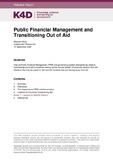| dc.description.abstract | This rapid review found an absence of literature focused specifically on measuring the impact of PFM and governance systems in countries that have transitioned from aid, by moving up the income ladder. However, there are a few academic publications and a limited number of studies by multilateral, such as the World Bank, that examine the role of PFM and governance systems in countries that are transitioning or have moved away from aid. However, the importance of public financial management (PFM) and governance systems in development is well established and seen as a pre-requisite for economic growth. To effectively transition from aid, most low-income countries (LICs) need to upgrade their PFM and governance systems to meet the different scale, resources, accountability mechanisms, and capacity-building requirements of a middle-income country (MIC). The absence of the above empirical evidence may be due to the complexity of measuring the impact of PFM reforms as the results are non-linear, difficult to isolate from other policies to establish causality, and manifest in a longer time frame. However, through comparative country studies, the consequences of deficient PFM and governance have been well documented. So impaired budgetary planning, implementation, and reporting, limited fiscal transparency, weak accountability mechanisms, resource leakage, and inefficient service delivery are well recognised as detrimental to economic growth and development.
The literature on transitioning countries focuses predominantly on the impact of aid withdrawal on the social sector, where comparative qualitative data is easier to obtain and the effects are usually more immediate, visible, and may even extend to global health outcomes, such as in AIDS prevention programmes. Thus, tracking the progress of donor-assisted social sector programmes is relatively easier than for PFM and governance reforms.
The literature is more abundant on the overall lessons of transitions from aid both for country governments and donors. The key lessons underscore the importance of PFM and governance systems and mechanisms to a successful transition up the income ladder: Planning for transition should be strategic, detailed and specifically geared to mitigate against risks, explicitly assessing the best mix of finance options to mitigate the impact of aid reduction/withdrawal on national budgets. The plan must be led by a working group or ministry and have timelines and milestones; Where PFM and governance is weak transition preparation should include strengthening PFM especially economic and fiscal legislation, administration, and implementation; Stakeholders such as donor partners (DPs) and NGOs should participate in the planning process with clear, open, and ongoing communication channels; Political and economic assessments in the planning and mid-term phases as well as long-term monitoring and evaluation should be instituted; Build financial, technical, and management capacity throughout the plan implementation
This helpdesk report draws on academic, policy, and grey sources from the previous seven years rather than the usual K4D five-year window, to account for the two-year disruption of COVID-19. As cross-country studies on PFM and governance are scarce, a few older studies are also referenced to ensure a comprehensive response to the query. The report focuses on low-income countries transitioning from aid due to a change in status to lower-middle-income countries. | en |

